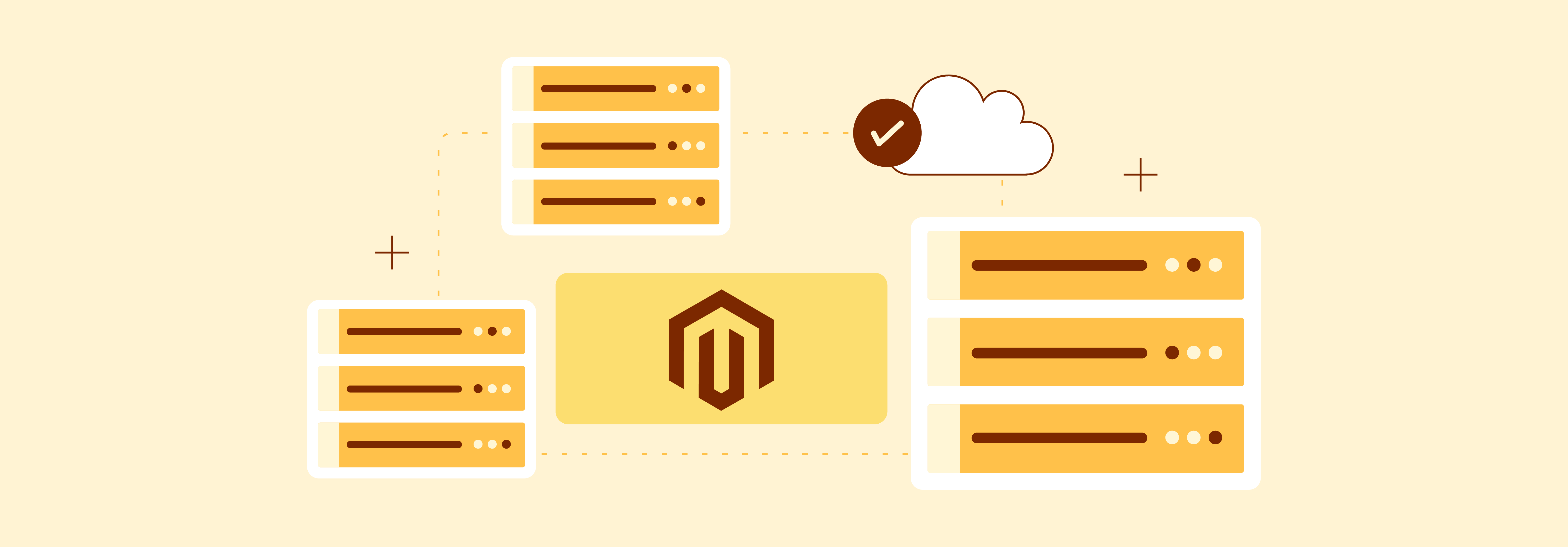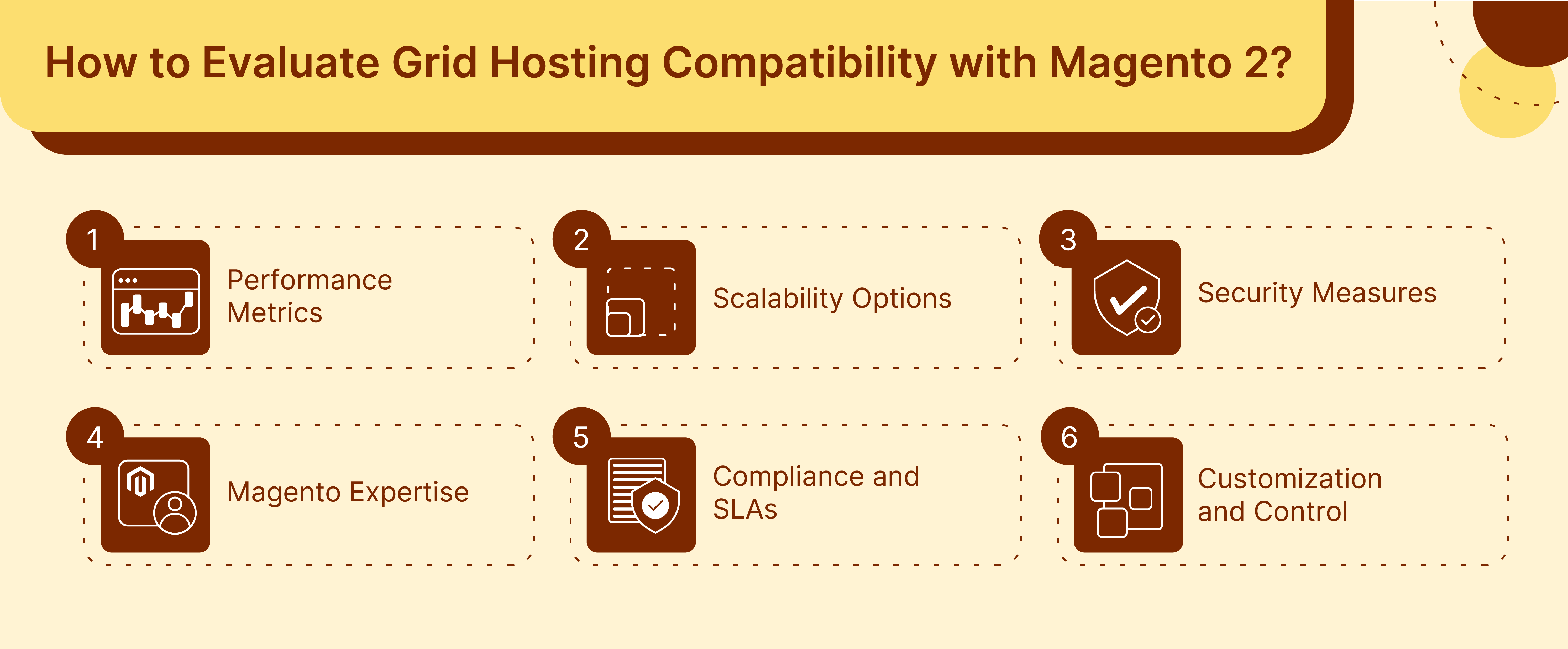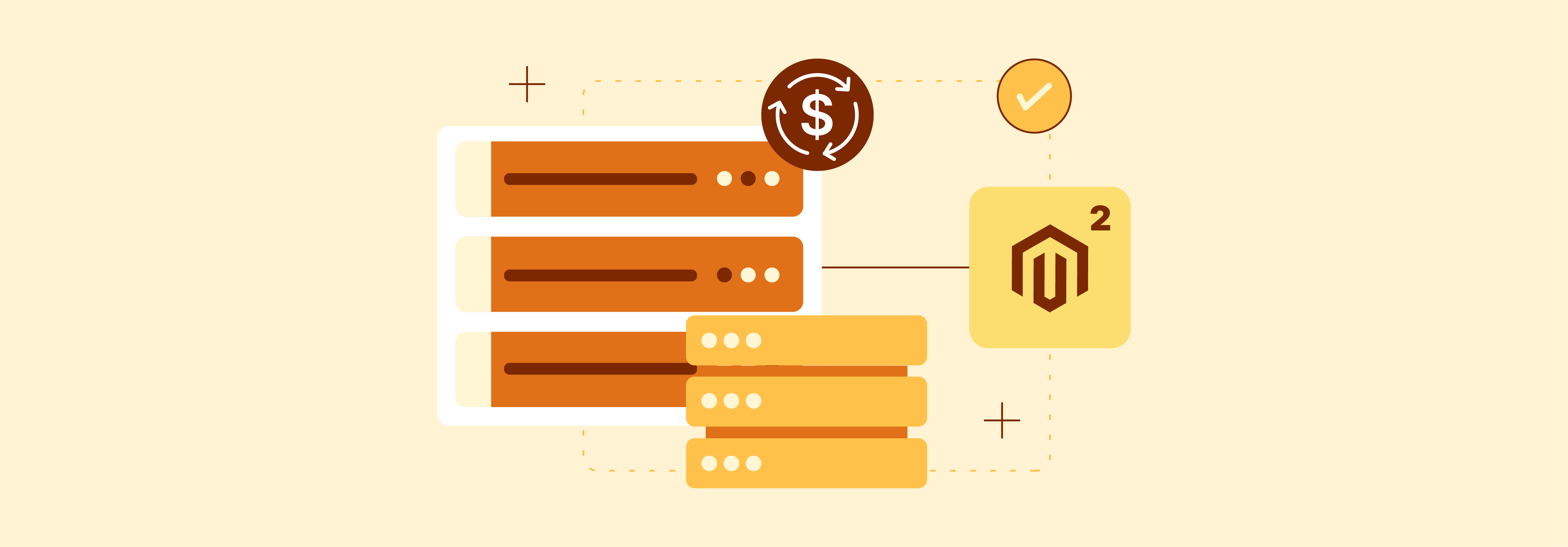
Does Grid Hosting Support Magento?
Does Grid Hosting Support Magento? For many seeking to launch or grow their ecommerce store, this question stands at the forefront of their hosting decisions. This article aims to examine the compatibility of grid hosting with Magento 2. We'll explore how features of grid hosting align with Magento 2's needs for performance, security, and scalability.
Key Takeaways
-
Grid hosting for Magento 2 involves a clustered infrastructure, distributing resources across multiple servers for high availability.
-
Key components of grid hosting include distributed servers, resource pooling, load balancing, etc.
-
Grid hosting outperforms shared hosting by offering consistent performance, easy scalability, and reliable uptime.
-
Potential drawbacks include the complexity of management, higher cost, and customization limitations.
-
Evaluating grid hosting compatibility involves assessing performance metrics and backup solutions.
-
Alternatives to grid hosting include dedicated server hosting and cloud hosting.
What is Grid Hosting for Magento?

Grid hosting is a type of clustered hosting where multiple servers work together in a grid to provide high availability and handle resource-intensive applications. Unlike traditional hosting, where a single server supports all the needs of a site, grid hosting distributes the load across multiple servers. This infrastructure ensures that resources such as data storage and processing power are readily available when needed.
Grid Hosting supports Magento and can offer significant advantages. It benefits those with high traffic and extensive product catalogs. Grid hosting meets these needs by providing a flexible, scalable environment that can adapt to the store's traffic and data demands without service interruption. Since resources are spread across multiple servers, the impact of a single server's failure is minimized.
Key Components of Grid Hosting Architecture
-
Distributed Servers: Unlike traditional hosting, where a single server might be responsible for all tasks, in grid hosting, tasks are spread across several Magento servers. This setup ensures that resources are always available, directly supporting the need for Magento stores to handle high traffic volumes.
-
Resource Pooling: Grid hosting employs a pool of resources, including processing power, memory, and storage, that any site or application can tap into as needed. For Magento users, this means the ability to scale resources up or down based on current demands. It ensures that the ecommerce site remains responsive even during peak traffic times.
-
Load Balancing: This component automatically distributes incoming traffic across multiple servers to ensure no single server becomes a bottleneck. Magento Load balancing helps maintain site performance and enhances the customer experience.
-
Automatic Failover: In case a server fails, grid hosting is designed to reroute traffic to the remaining operational servers automatically. It minimizes website downtime, ensuring that Magento stores stay online without interruption. This reliability helps maintain customer trust and sales continuity.
-
Centralized Management: Despite the complexity of its infrastructure, grid hosting is managed centrally, which simplifies tasks such as updates, security, and scaling for the host team. Magento site owners benefit from this feature, as it allows for easy management of their online store without needing to understand the intricacies of server administration.
-
Scalability: Perhaps one of the most critical components for Magento stores, grid hosting offers unparalleled Magento scalability. As stores grow and their needs evolve, they can easily allocate more resources to accommodate more products, higher traffic, and additional transactions. It is done without the need for a complete infrastructure overhaul.
-
Security and Compliance: With multiple servers at play, grid hosting can offer enhanced security measures. Data is protected across the network, and in many cases, hosting services include PCI compliance with industry standards. It helps safeguard operations against legal and financial repercussions while building trust with customers.
-
Support Services: Hosting services that specialize in grid hosting for Magento ecommerce sites offer dedicated support to help store owners manage compliance requirements. These services include regular security audits, compliance assessments, and updates to security protocols. It also relieves the store owner of the technical burden, allowing them to focus on growth and customer service.
Shared vs. Grid Hosting: Key Differences

1. Resource Allocation:
Shared Hosting: In a shared environment, multiple sites reside on a single server, sharing its resources such as CPU, RAM, and disk space. It can lead to limited availability of resources for your Magento site, especially during peak traffic times.
Grid Hosting: Grid hosting, on the other hand, pools resources from multiple servers. It ensures that a Magento store can access additional resources as needed, providing a more flexible and scalable solution.
2. Performance
Shared Hosting: The performance of your Magento site can be significantly impacted by other sites on the same server. High traffic or resource demands from one site can slow down others.
Grid Hosting: By distributing the load across several servers, grid hosting can maintain consistent performance levels for your Magento site, even under heavy traffic.
3. Scalability
Shared Hosting: Scaling resources on a shared server can be challenging and often requires migrating to a higher plan or a different hosting type.
Grid Hosting: Grid hosting allows for easy scalability, enabling your Magento store to grow seamlessly without the need for Magento migration.
4. Security
Shared Hosting: Security breaches, like cross-site contamination or a compromised neighboring site, can affect others due to the shared infrastructure.
Grid Hosting: Grid hosting offers enhanced security measures such as individualized virtual environments and advanced firewall protections. The distributed nature of resources across multiple servers minimizes the risk of widespread attacks. It ensures that issues on one server do not impact the entire network.
5. Reliability and Uptime
Shared Hosting: Shared servers can be prone to downtime if one of the hosted sites consumes excessive resources or if there's a hardware failure.
Grid Hosting: With grid hosting, if one server goes down, others in the grid can compensate, leading to higher uptime and reliability for your Magento store.
6. Support and Customization
Shared Hosting: Support and customization options might be limited due to the standardized environment meant to cater to a wide range of clients.
Grid Hosting: Providers offer specialized support and customization options like dedicated technical assistance, advanced configuration settings, and specific optimization services. These options ensure that Magento store owners can fully leverage the hosting infrastructure to enhance site performance, security, and user experience. It helps align with their unique business needs and goals.
7. Pricing
Shared Hosting: Shared hosting is more affordable, with plans ranging between $3 to $10 per month. This cost-effectiveness makes it an attractive option for new or small Magento stores with limited budgets.
Grid Hosting: Grid hosting may come with a higher price tag, ranging between $20 to $100 per month or more, based on the required resources and services. This investment can be justified by the superior performance, scalability, and security it offers. These features are essential for growing or large-scale Magento operations seeking to maintain high levels of customer satisfaction and engagement.
Potential Drawbacks of Grid Hosting

1. Complexity in Management
The architecture of grid hosting is inherently more complex than that of traditional hosting solutions. This complexity can pose challenges for store owners or teams without technical expertise. Managing and optimizing a Magento site across a distributed server environment requires a nuanced understanding of the infrastructure.
2. Higher Cost
The advanced capabilities of grid hosting come at a higher Magento cost compared to shared hosting. Small Magento stores or startups with limited budgets might find the initial investment and ongoing costs challenging to justify.
3. Customization Limitations
Although grid hosting is highly scalable and flexible, there may be limitations on the level of customization available for specific server environments. Magento stores with highly specialized hosting needs might encounter constraints in tailoring the hosting environment to their exact requirements.
4. Resource Allocation Transparency
In a grid hosting setup, it can sometimes be difficult for clients to gauge the exact allocation of resources to their Magento site. This lack of transparency can make it challenging to predict performance under peak loads or to identify when additional resources are necessary.
5. Dependency on Provider
The performance and reliability of a Magento store in a grid hosting environment heavily depend on the provider's infrastructure and expertise. Choosing a provider without a proven track record or inadequate support for Magento can lead to suboptimal Magento performance and customer experiences.
6. Security Concerns
Despite the inherent security advantages of distributed resources, the interconnected nature of grid hosting could introduce complexities in enforcing consistent security policies across all nodes. Magento stores must ensure their hosting provider implements reliable security measures and complies with ecommerce security standards.
How to Evaluate Grid Hosting Compatibility with Magento 2?

-
Performance Metrics: Assess the grid hosting provider's performance metrics, such as load time and uptime guarantees. Magento 2, being a resource-intensive platform, requires consistent performance levels to maintain a smooth online shopping experience.
-
Scalability Options: Verify the ease and flexibility of scaling resources. A Magento 2 store must be able to scale resources up or down without downtime, especially during traffic surges or sales events.
-
Security Measures: Examine the security protocols and measures the hosting provider implements. Given the sensitive nature of ecommerce transactions, your Magento 2 site needs advanced security features to protect customer data.
-
Magento Expertise: Look for a hosting provider with a dedicated team or significant experience in managing Magento 2 sites. A highly skilled support team that understands the intricacies of Magento can offer valuable technical guidance and quick issue resolution.
-
Compliance and SLAs: Review the service level agreements (SLAs) for details on performance, support response times, and uptime guarantees. Ensure the provider complies with industry standards relevant to ecommerce, such as PCI DSS for payment security.
-
Customization and Control: Determine the level of control and customization options available for your hosting environment. Magento 2 may require specific server configurations or custom setups to optimize performance and functionality.
-
Developer Tools and Support: Check the availability of developer tools and resources. The ability to access, manage, and deploy changes efficiently is critical for the ongoing development and maintenance of a Magento 2 site.
-
Client Testimonials and Case Studies: Seek out feedback and case studies from existing customers, especially those running Magento 2 sites. Real-world experiences can provide insight into the provider's ability to meet the demands of a high-performance ecommerce platform.
-
Cost vs. Value Analysis: Consider the cost of the hosting service in relation to the value it brings to your Magento 2 store. Its benefits in terms of scalability, performance, and reliability should align with your ecommerce objectives.
-
Backup and Recovery Solutions: Ensure there are effective Magento backup and disaster recovery solutions in place. Data is a critical asset for any Magento 2 store, and the ability to recover quickly from data loss is essential.
Alternatives to Grid Hosting for Magento 2
1. Dedicated Server Hosting for Magento 2

Dedicated server hosting allocates an entire server to a single client. This exclusivity offers Magento 2 stores a high level of control, security, and resource allocation. Dedicated servers are particularly beneficial for ecommerce sites with high traffic volumes. They are beneficial for those requiring extensive customization and peak performance levels.
Control and Resource Allocation: The key advantage of a dedicated server is the unparalleled level of control and customization it offers. Magento 2 store owners can optimize server configurations to meet their specific needs, enhancing site performance and customer experience.
Cost Consideration: However, this exclusive access and high degree of customization come at a higher cost compared to grid hosting. The superior performance justifies the investment in dedicated server hosting and the control it delivers. It is suitable for large-scale Magento stores with significant budgets.
2. Cloud Hosting for Magento 2

Cloud hosting represents a flexible and scalable alternative for Magento 2 stores. It leverages a network of virtual servers and offers resources on-demand to accommodate fluctuating traffic and load levels.
Scalability and Resource Management: The primary advantage of cloud hosting is its scalability. Resources can be scaled up or down based on real-time demand, ensuring that Magento 2 stores operate efficiently without paying for unused capacity. This Magento hosting resource management helps maintain optimal site performance.
Pricing Model: Cloud hosting often employs a pay-as-you-go pricing model, allowing businesses to pay only for the resources they use. This model can offer cost savings for Magento stores with variable traffic patterns, providing an economical yet powerful hosting solution.
FAQs
1. How does grid Magento hosting benefit in terms of customer experience and scalability?
Grid hosting ensures a seamless customer experience by distributing resources across multiple servers, preventing performance issues during peak traffic. Its scalability allows your store to easily adapt to varying data demands, supporting efficient business growth.
2. Can grid hosting help me keep my Magento store secure and compliant?
Yes, grid hosting enhances security by offering individualized virtual environments and advanced firewall protections. It often includes PCI compliance, safeguarding your operations against legal and financial repercussions, and building trust with customers.
3. How does grid hosting simplify management tasks for my Magento store?
Despite its complexity, grid hosting is centrally managed, streamlining tasks like updates, security, and scaling for your hosting team. It allows Magento store owners to focus on business growth and customer service without going into intricate server administration.
4. What advantages does grid hosting offer over shared hosting?
Grid hosting maintains consistent performance levels even under heavy traffic, provides easy scalability, and offers specialized support and customization options. It ensures your Magento store can achieve overall efficiency, aligning with unique business needs and goals.
5. How does grid hosting compare with dedicated server hosting in terms of control and resource allocation?
Grid hosting provides control by distributing tasks across multiple servers, while dedicated server hosting offers exclusive access for maximum control and customization. Choose grid hosting for flexibility, scalability, and a cost-effective Magento solution. Opt for dedicated hosting for unparalleled control, especially for large-scale Magento stores.
Summary
Does Grid Hosting Support Magento? The short answer is yes. Grid hosting excels in distributing the load across multiple servers, ensuring high resource availability for Magento stores. It is especially beneficial for those with high traffic and extensive product catalogs.
This article covered various components of grid hosting architecture. It explored key differences between shared and grid hosting and discussed the potential limitations of grid hosting. You can explore various options for Magento server hosting to find the best fit for your store's needs and goals.



